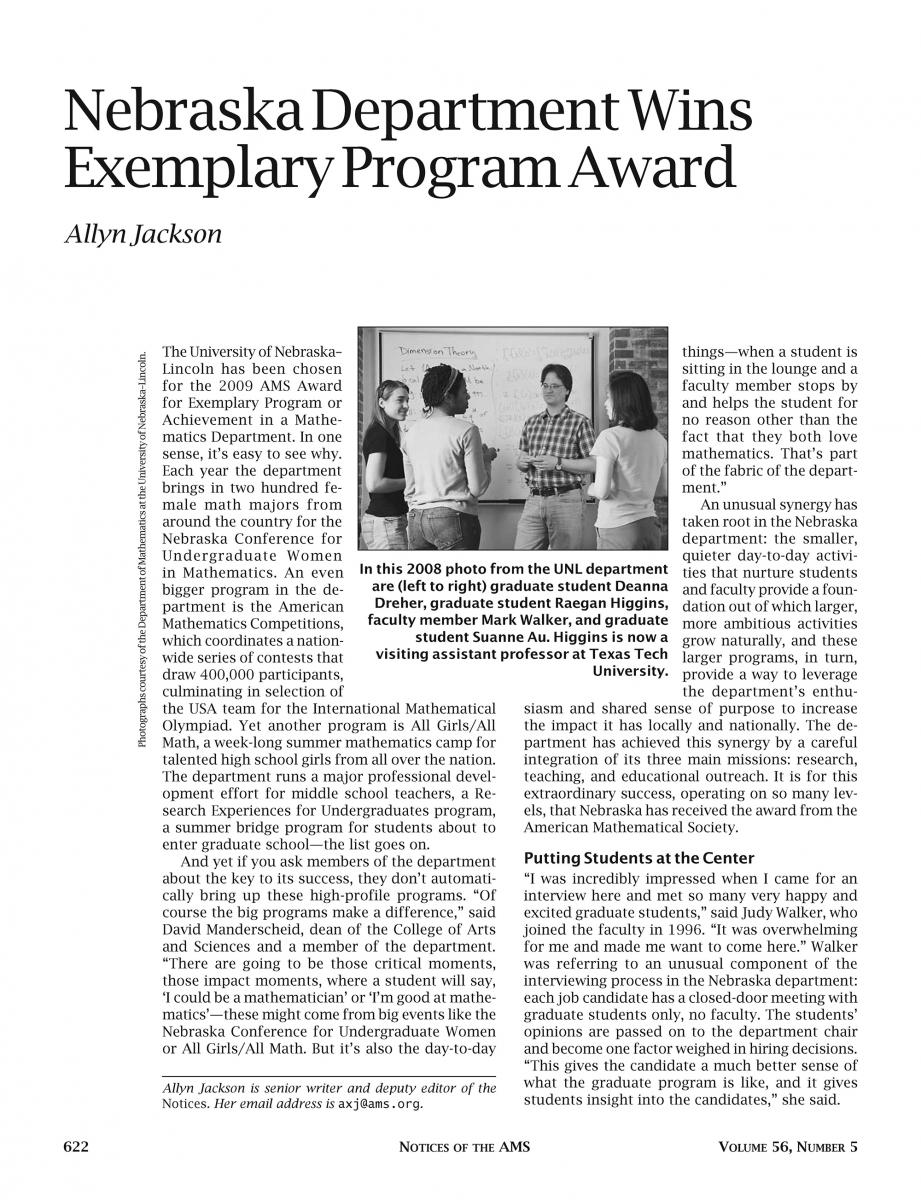
Graduate Program in Mathematics
As a recipient of a Presidential Award for Excellence in Science, Mathematics and Engineering Mentoring, the Nebraska Department of Mathematics is committed to providing a friendly and supportive atmosphere. With more than 80 graduate students and more than 30 faculty members, our community allows graduate students to become involved in a full range of activities—teaching, outreach, scholarship, and internships—during their time at Nebraska.
Nationwide, only 36% of graduate students and 25% of Ph.D. recipients are women. However, in our department, 45% of our current teaching assistants are women, and we have 12 women faculty members. Forty-six percent of our Ph.D. recipients in the past five years have been women. We are known nationally for our Nebraska Conference for Undergraduate Women in Mathematics, which supports students in their pursuit of graduate school.
After graduation, our students go on to successful careers in academia, government, and industry. In the past seven years, our department has had six National Science Foundation Graduate Fellowship recipients enter our program or obtain one of four prestigious fellowships while a student at Nebraska. Four of our graduates have earned NSF Postdoctoral Fellowships.
Graduate students can apply for the Doctor of Philosophy (MS/PhD), for those intending to receive a master's as well as a Ph.D.; the Doctor of Philosophy (PhD), for those who plan to receive only a Ph.D.; a Master of Science (MS) or a Master of Arts (MA), for those who intend to only receive a master's degree; or a Master of Arts for Teachers (MAT). Our Master of Arts for Teachers offers a degree program in mathematics for secondary mathematics teachers and also an option for middle-level teachers (grades 5-8) who can earn a specialization in the teaching of middle-level mathematics. (Emphasis is placed on deepening teachers' mathematical knowledge for teaching by focusing on advanced mathematical concepts that underlie or have strong connections to the school curriculum. Applicants must have a valid teaching certificate.)
Come to Nebraska to Pursue Research in...
Algebra, Discrete Mathematics, and Topology
- algebraic geometry, coding theory, combinatorics, commutative algebra, geometric group theory, K-theory, low dimensional topology
Applied Mathematics, Pure and Applied Analysis, and Mathematical Biology
Effective and Evidence-based Teaching
The department is known as a national leader in active learning and other evidence-based instructional methods. Faculty with our first-year mathematics program oversee the training and mentoring of our graduate teaching assistants in active-learning strategies, which encourage the student-led questioning, reasoning, and communication of key mathematical concepts, with instructors promoting engagement and building on student thinking. Faculty members Josh Brummer and Kevin Gonzales lead start-of-semester orientations and teach a pedagogy course to the graduate teaching assistants as they teach their first course as instructor of record, which has greatly contributed to increased student success in first-year mathematics courses. Student success in calculus is growing alongside the number of classrooms that incorporate active learning. The department measures student success as the percentage of students earning a grade of C or better. By that metric, the success rate of Calculus I has risen from 62% to more than 75%. The success rate in Calculus II, meanwhile, has approached 80%.
In the News:
Office of Diversity and Inclusion
The University of Nebraska-Lincoln offers many opportunities for students to explore issues related to diversity and inclusion in formal educational settings, from individual courses to various degree programs. Here is a list of some of these opportunities. Additional information may be found in the Graduate Bulletin.
University of Nebraska–Lincoln faculty, postdoctoral scholars, and graduate students lead and are involved in externally and internally funded projects that explore issues related to diversity, inclusion, and equity. Learn more at https://diversity.unl.edu/research.
Financial Support
Teaching Assistantships:
- Beginning stipends for 2023-2024 are $18,000 for the nine-month academic year.
- Complete tuition waiver and subsidized medical coverage.
-
Many math graduate students find internships at companies and national labs, have research assistantships supported by grants, or participate in external instructional or research programs. We encourage you to seek out these opportunities since they can have a positive effect on your career. While summer teaching appointments are not guaranteed, the department has been able to offer summer appointments to almost all interested graduate students over the last decade. Information about departmental and external opportunities is communicated throughout the year.
Fellowships:
- Othmer fellowships add between $4,000 and $8,000 to an annual TA stipend for three years.
- Chancellor’s Fellowships add $4,000 to an annual TA stipend for two years.

An unusual synergy has taken root in the Nebraska department: the smaller, quieter day-to-day activities that nurture students and faculty provide a foundation out of which larger, more ambitious activities grow naturally, and these larger programs, in turn, provide a way to leverage the department’s enthusiasm and shared sense of purpose to increase the impact it has locally and nationally. The department has achieved this synergy by a careful integration of its three main missions: research, teaching, and educational outreach.
Other Awards:
- Carnegie Initiative on the Doctorate
- National Doctoral Program Survey, 2000, conducted by the National Association of Graduate and Professional Students: Our department ranked first out of all mathematics graduate programs included in the survey in nearly every category, including Overall Satisfaction.